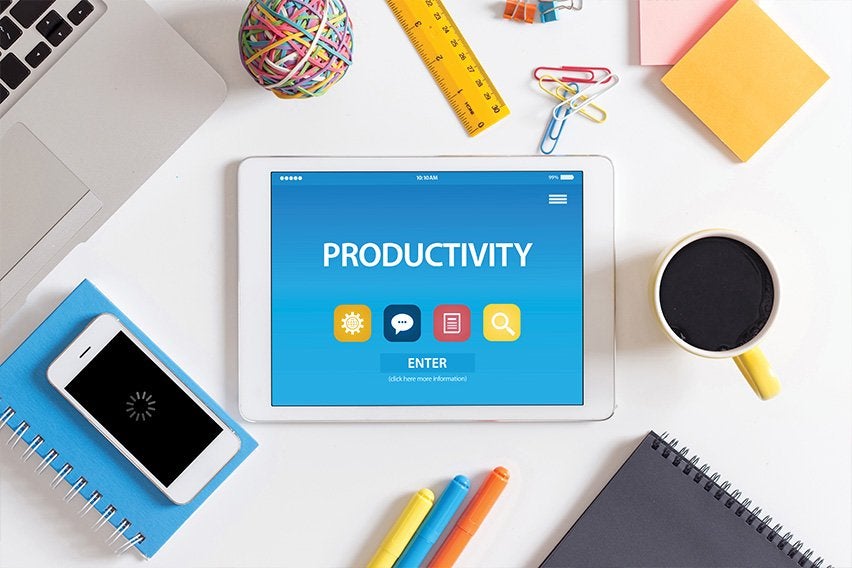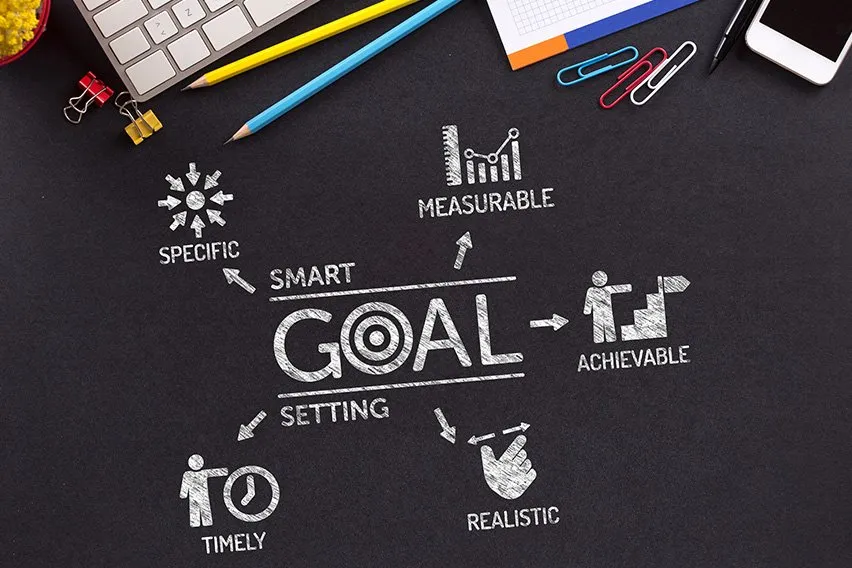Productivity Tips for Work: 10 Ways to Maximize Your Productivity

Staying productive can be a challenge. Even with the best of intentions, there are a lot of ways one’s workday may not be as productive as it could be. Some issues are simply because of the way things have always been done at the office, others relate to personal habits.
Here are our top 10 ways to make your work day more productive:
- Use Proper Online Tools to Increase Productivity
- Insist on Agendas for Meetings
- Hold Status Update Meetings
- Multitask Less to Be More Productive
- Improve the Physical Work Environment
- Delegate
- Take a Day Off
- No Meetings on Fridays
- Eat to Increase Productivity
- Sleep More
1. Use Proper Online Tools to Increase Productivity
Are you still clinging to old software or technology, when new programs or apps can increase your productivity and that of your team’s? Take a program like Google Docs, which allows you to create and share documents with team members instantly, without the need to save them or attach them to emails, or to try and remember which documents are the latest versions. You can grant other people the ability to view a document, or edit it. Imagine how much time all these features can save you.
With messaging apps like Slack, you can send instant messages to individuals or groups, without the process of setting up new emails every time. You can easily refer to these same threads later, to track down information faster.
Ask contacts or friends who work at other companies what they’re using and why. You may be surprised to find yourself enjoying these programs too, and wondering why you waited so long to start using them.

2. Insist on Agendas for Meetings
Ever gone to a meeting and none of the invitees understood exactly why they were there? And the meeting planner seemed to have an issue but wasn’t clear on what he was hoping to accomplish by calling the meeting, or the ask of you all? There’s an hour you won’t get back.
If a meeting is coming up and you haven’t received an agenda in advance, then ask for one. Mention that you’re hoping to give this some thought before the meeting, so you can come prepared with information that may help, or even solutions.
3. Hold Status Update Meetings
Biweekly, or even weekly (depending on your department’s workload), hold a private one-hour meeting with each of your team members. Each of them should come to this meeting with a list of the projects they are working on, along with updates and any questions that need answering.
Status updates will free up your time for what you need to work on. This is because you will find, as time goes on, there will be less chance of your morning or day’s plans being derailed by one of your team member’s flagging a problem. This is because everyone will know that, unless it’s an emergency, they can discuss these issues with you at their next status update. This will also help them to prioritize.
One other thing about status updates. Ask your team members to think about possible solutions for any issues, before they come to the meeting. This will save time when you do meet, and help your staff to grow within their roles.
If you are not a manager, suggest status updates to your supervisor.
4. Multitask Less to Be More Productive
Ever had a day where you didn’t do anything you originally planned? Or you started on one thing, and ended up working on a dozen other things? So, you ended up moving the needle a little on a bunch of projects, but didn’t actually get anything finished?
According to Psychology Today, you can lose up to 40% of your productivity due to multitasking. Multitasking is also likely to result in more errors in your work, partially because you can’t give any one thing your full attention. And, it’s exhausting.
Set aside time in your calendar to work specifically on one project and one project only. During this time, don’t answer the phone or check emails. Set aside the last hour of the day to return calls or to reply to messages.
Try this every day for a week and see what happens. You’ll find you’re likely to get more work done and get it done faster, and you’ll feel better.
5. Improve the Physical Work Environment
Take a good look around your work area. What is the lighting like? If you’re in an open floor plan with no offices, how close are the desks together? What proximity are you or your team to high traffic areas, where constant noise might be an issue? What’s the temperature like – is it often too hot or too cold?
There might be other issues as well, that are less obvious. Maybe the walls could use repainting, or the furniture updating. For instance, maybe the chairs the company uses look extremely comfortable, but typically result in back pain after a few hours. Or the desks are too small.
Consult your team members for their feedback too.
Maybe the solution is simple, like moving your team to an unused area of the building. If there isn’t a simple fix, see if you can budget some money for improvements. Some issues may not be instantly resolvable, but if you don’t get them on the radar of upper management, they never will be.
6. Delegate
This is often a problem for new managers, but veterans will fall into this trap as well. Sometimes managers think they will be seen as weak if they don’t do most of the work themselves. The reality is that often they will be seen as not being able to prioritize.
Ask yourself how much work you have on your plate. Do you really need to do it all? Why? There must be some projects or tasks you can delegate. This will mean less chance of you multitasking, and more time spent focused on the projects you need to focus on. These will be the ones that use your skills to the best.
When delegating, remember to explain not only why the project is important, but also why you chose the team member you did, to execute it. Highlight the individual’s particular skills and how they are appropriate for this assignment.
Delegating doesn’t mean you give up complete interest or authority in the project, you should check in from time to time (see section 3 above, on status updates). And remember to praise your team member publicly when the project is carried out successfully.
Check out this article from Entrepreneur.com for 5 Tips to Master the Delicate Art of Delegation.
7. Take a Day Off
Often people are afraid to leave their work or a project unattended, even for a day. Ask yourself – what is 8 hours anyway? It’s not really a lot of time, and this break can help you to recharge your batteries. Especially if Saturday, Sunday and regular holidays are tied up with family or other commitments.
If you are super busy, schedule a day in advance, and make sure at least one hour the day before is booked in your calendar to prepare for that day off. This could be to delegate tasks, or to simply let stakeholders of a particular project know you’ll be out of the office.
Now that you have the day, what are you going to do with it? The answer is, whatever you want that’s going to make you feel good. Maybe it’s getting some extra sleep, or going to a movie matinee. A massage, perhaps. But try and make this day about you, as opposed to chores or other commitments. You want to go back to the office with a clear head.
8. No Meetings on Fridays
This doesn’t have to be Fridays. Suggest to upper management that your company take a day of the week – any day, and make it policy to not hold meetings on that day. This means nothing scheduled, no impromptu meetings, no crowding around somebody’s desk. Make it company wide, and put it in all staff’s calendars so that the policy can’t be circumvented.
Here is a LinkedIn article on how a no meeting day improved productivity at a company called SpinWeb.
Of course, a no meeting day has to be realistic for the type of company or department. Perhaps a sales or editorial department would suffer from such a policy. Consider if it’s realistic first, for the type of work you do.

9. Eat to Increase Productivity
Often when people get overloaded, they don’t stop to eat. In order to stay productive, people need to have regular meals. Not eating can result in stress, loss of concentration, and mood swings.
And although working through lunch is way too common today, meals shouldn’t always be taken at one’s desk.
If you didn’t bring a lunch with you, take the time to go and get something to eat. Sit down in the cafeteria, rather than staring at your computer screen. Enjoy your meal with others, or if by yourself, try to think about things unrelated to your work. This way, when you return to your desk, you’re not hungry, and you’ll be able to better concentrate on what needs to be done.
Also, be careful about what you do eat. An imbalanced meal can really affect your productivity. For instance, too much sugar may make it hard for you to concentrate.
It will be easier for you to plan out a balanced meal if you bring one from home. And bringing lunch with you will be one less thing for you to worry about, the day of. It also means you are less likely to skip eating it.
10. Sleep More
Do you find yourself staying up late every night, then dragging yourself out of bed each morning? Then it’s a mad rush to get to work on time, and you’re starting each day feeling exhausted?
Glassdoor, an online tool that allows employees to rate companies, has reported that 74% of workers get less than 7 hours of sleep per night, lower than the 7 – 9 hours recommended by the National Sleep Foundation.
It seems like common sense. If you’re tired, you’re not going to have enough energy to be able to do good work. This will not only affect your performance, but your overall health too. Take care of yourself by getting enough sleep.
RELATED ARTICLES
 How to Develop Leadership Skills in Employees. Top 5 Ways
How to Develop Leadership Skills in Employees. Top 5 Ways Setting Employee Goals: The Why and How of Goal-Setting
Setting Employee Goals: The Why and How of Goal-Setting What are SMART goals? Acronym Explained
What are SMART goals? Acronym Explained Small Business Management: An Extensive Guide
Small Business Management: An Extensive Guide How to Start a Small Business: A 7-Step Process
How to Start a Small Business: A 7-Step Process How to Hire Employees: A Step-By-Step Guide
How to Hire Employees: A Step-By-Step Guide